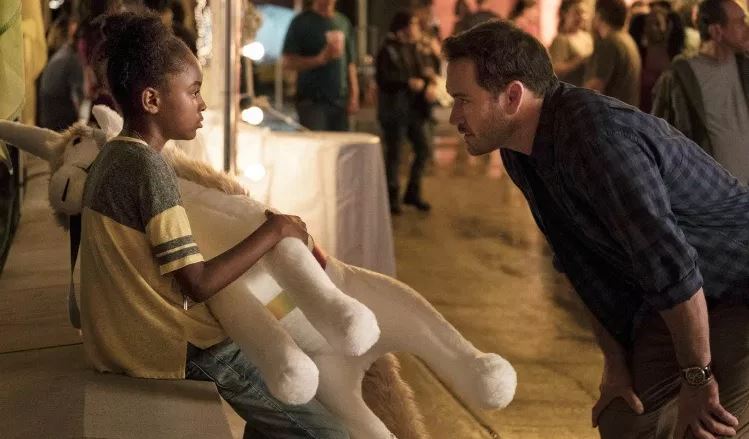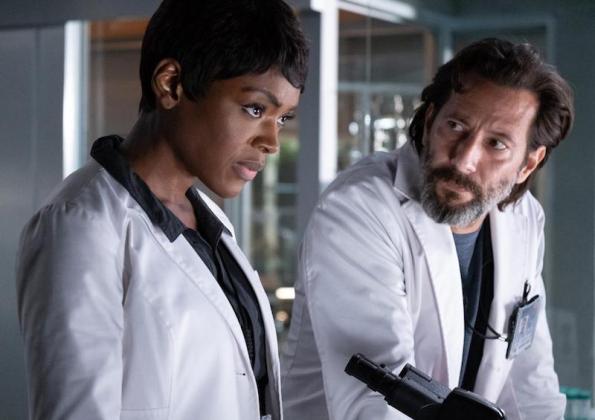
“We’re not qualified to decide what’s right and wrong, ‘cause we don’t know the difference anymore.”
Coming in with the second episode of its young life, The Passage steps back from much of the action—for the most part—to maintain an increased focus on the characters inhabiting this world as this ever so slowly inch towards the darkness.
As a world-building introduction, premiere episodes are often inundated with so much information that they, in parts, come across as cumbersome and rushed. Last week’s pilot, with Wolgast and Amy on the run for much of it, as well as giving viewers the gist of Project Noah and all those involved, was no exception. “You Owe Me A Unicorn” is a step back from that approach and, despite being bookended by high adrenaline action pieces, is a calmer character study that furthers the bond between Wolgast and Amy while shedding even more light on the origins of Project Noah as well as the conflict within its walls.

In last week’s review, I mentioned the importance of having a believable chemistry between Wolgast and Amy to the success of the show. “Unicorn” does a fabulous job building on the pilot’s foundations as the unlikely duo find shelter with Lacey, Wolgast’s former Navy TO, in the quiet countryside of Wisconsin. Even before their arrival, the pair has a heated exchange where Amy’s sass is on display. Were it not for her very real fears of abandonment, that attitude would have been the standout. As it is, Amy draws a line in the sand; “you don’t leave me and I don’t leave you”. It’s that final spackle binding them together, one that is revisited in the episode’s unfortunate end as the two, despite all their running, are forced to give up the fight when Richards and his team corner them. But even being captured by the antagonists, they will find strength in each other; a strength that will take them through the final days.

In addition to deepening the Amy/Wolgast relationship, “Unicorn” peels back the layers on Project Noah and the driving factor behind the project, Jonas Lear. Told in a few short flashbacks to 2015 (prior to his trek through Bogota, we get to see Lear’s motivations for everything he’s doing. His wife, Elizabeth, was diagnosed with Alzheimer’s and her only hope is to find a homerun-type find; a find that beckons him to Bogota and is the precursor for the ensuing narrative. Now that things are up and running, Lear doesn’t have carte blanche to do whatever he pleases with the research. His wife warned him that he’d cross ethical lines there’d be no coming back from and with Dr. Sykes pushing to bring Amy in for a test subject, Elizabeth’s words have become prophetic. What works so well though is that Sykes shares Lear’s own conflicting emotions regarding the use of a child as a test subject. She’s not without empathy but is putting the potential welfare of thousands ahead of the small risk (according to her) to Amy. It makes for a much more interesting narrative in that, while being the antagonist, the viewers aren’t able to give Sykes and the Project Noah team their unadulterated hate. Though, the ethical tenants are there for a reason because, if they weren’t, every situation could conceivably be twisted to fit ‘the means justifies the ends’ narrative. From the show’s perspective, Sykes’ decision is a bit more understandable considering the massive loss of life eminent within a few short months if they are unable to work out the kinks in their cure.
Taking the snippets of horror presented by Fanning and Babcock, it seems as if the framing of the cure’s side effects as “kinks” is a bit of an understatement. With Carter being the most recent (and youngest) test subject, the results he’s seeing are faster than the others. Unfortunately for him though, the two true villains of the series have targeted him for indoctrination into their plans for a new world. Again, Carter’s inclusion on death row does not jibe with the others as he comes across as principled and genuine good guy. He doesn’t hesitate to turn down Fanning, knowing that, even in a dream, Fanning and Babcock represent something vile and corrupt. Whether his attitude will change as the cure works its way through his system remains to be seen but, out of the twelve, Carter may be the key to Amy’s survival when you-know-what hits the fan.
The Road Less Traveled
- Anytime a writer can present an antagonist who, from his or her point of view, is doing the right thing (or a bad thing for the greater good), it adds a layer of complexity to the narrative. There are very few things you can classify as black and white, so not only is that type of storytelling more compelling, it adds a bit of realism to the characters, even if the world we’re in is fantastical. Lear, Sykes—even the brutal Richards—are all doing their jobs. Their purpose is a messy one, a road that will stain their souls but one necessary in their eyes. We don’t see much contrition from Richards (at least not yet) but the regret Lear and Sykes have shown is very real.
- The quiet scene between Wolgast and Lila was a powerful and necessary to expand on Wolgast’s pain and his nearly instant connection with Amy. The pilot episode touched on the loss of his daughter, Eva, but that loss is felt even more profoundly as he finally opens up to his ex-wife about it. “I watched our daughter die,” he says, “and I couldn’t stop it.” That powerlessness he felt at losing his daughter fuels his determination to keep Amy safe. To Wolgast, he may not have been able to save Eva but he’ll do everything he can to keep Amy from harm.
- Babcock’s murder of the janitorial asshat was not unexpected. Couple it with Carter’s message to Lear from Fanning, it would seem as if the good doctor would really think about canceling this little experiment but it goes back to two things: 1) he’s not fully in charge of the operation and 2) his determination for it all to succeed is reinforced by his visit to Elizabeth, who’s truly under the horrid effects of Alzheimer’s.
![]()
